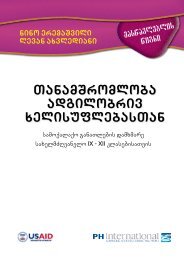The Geneva Protocol, by David Hunter Miller
The Geneva Protocol, by David Hunter Miller
The Geneva Protocol, by David Hunter Miller
Create successful ePaper yourself
Turn your PDF publications into a flip-book with our unique Google optimized e-Paper software.
CHAPTER XX. 111<br />
must comply is that, in the choice of arbitrators, it must bear in mind the guarantees of competence and<br />
impartiality which, <strong>by</strong> their nationality, their personal character and their experience, these arbitrators must<br />
always furnish.<br />
Article 4. paragraph 6.<br />
Effect of, and Sanction enforcing, Decisions.--Failing a friendly arrangement, we are, thanks to the system<br />
adopted, in all cases certain of arriving at a final solution of a dispute, whether in the form of a decree of the<br />
Permanent Court of International Justice or in the form of an arbitral award or, lastly, in the form of a<br />
unanimous decision of the Council.<br />
To this solution the parties are compelled to submit. <strong>The</strong>y must put it into execution or comply with it in good<br />
faith.<br />
If they do not do so, they are breaking an engagement entered into towards the other signatories of the<br />
<strong>Protocol</strong>, and this breach involves consequences and sanctions according to the degree of gravity of the case.<br />
If the recalcitrant party confines itself to offering passive resistance to the solution arrived at, it will first be<br />
the object of pacific pressure from the Council, which must exercise all its influence to persuade it to respect<br />
its engagements. If the Council is unsuccessful, it must propose measures calculated to ensure effect being<br />
given to the decision.<br />
On this point the <strong>Protocol</strong> has been guided solely <strong>by</strong> the regulation contained at the end of Article 13 of the<br />
Covenant. <strong>The</strong> {180} Council may thus institute against the recalcitrant party collective sanctions of an<br />
economic and financial order. It is to be supposed that such sanctions will prove sufficient. It has not appeared<br />
possible to go further and to employ force against a State which is not itself resorting to force. <strong>The</strong> party in<br />
favour of which the decision has been given might, however, employ force against the recalcitrant party if<br />
authorised to do so <strong>by</strong> the Council.<br />
But if the State against which the decision has been given takes up arms in resistance thereto, there<strong>by</strong><br />
becoming an aggressor against the combined signatories, it deserves even the severe sanctions provided in<br />
Article 16 of the Covenant, interpreted in the manner indicated in the present <strong>Protocol</strong>.<br />
Sphere of Application of Methods of Pacific Procedure.--Necessary as the system which we have laid down is<br />
for the purpose of ensuring settlement of all disputes, in applying it, the pacific aim which underlies it must be<br />
the only guide. It must not be diverted to other purposes and used as an occasion for chicanery and<br />
tendencious proceedings <strong>by</strong> which the cause of peace would lose rather than gain.<br />
A few exceptions to the rule have also had to be made in order to preserve the elasticity of the system. <strong>The</strong>se<br />
are cases in which the claimant must be nonsuited, the claim being one which has to be rejected in limine <strong>by</strong><br />
the Council, the Permanent Court of International Justice or the arbitrators, as the case may be.<br />
<strong>The</strong> disputes to which the system will not apply are of three kinds:<br />
Article 4, paragraph 5.<br />
1. <strong>The</strong> first concerns disputes relating to questions which, at some time prior to the entry into force of the<br />
<strong>Protocol</strong> have been the subject of a unanimous recommendation <strong>by</strong> the Council accepted <strong>by</strong> one of the parties<br />
concerned. It is essential to {181} international order and to the prestige of the Council that its unanimous<br />
recommendations, which confer a right upon the State accepting them, shall not be called into question again<br />
<strong>by</strong> means of a procedure based upon compulsory arbitration. Failing a friendly arrangement, the only way<br />
which lies open for the settlement of disputes to which these recommendations may give rise is recourse to the
















